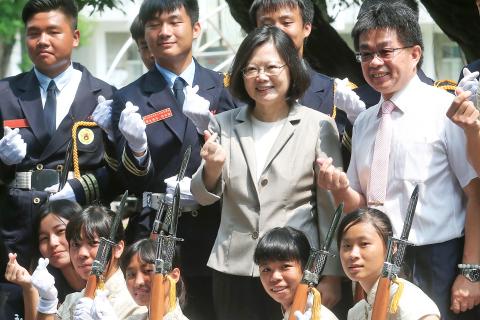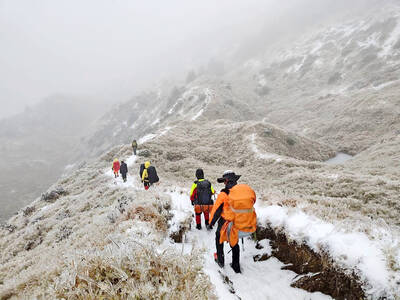The government will raise the salaries of soldiers in chemical warfare, engineering and communications units, President Tsai Ing-wen (蔡英文) said during her review of the 99th Marine Brigade yesterday.
If a plan by the Ministry of National Defense to give bonuses to combat troops is approved by the Executive Yuan, military personnel in other branches might also receive extra pay, a ministry official said on condition of anonymity.
The ministry does not know whether the Executive Yuan, which is evaluating the plan, will accept it in part or as a whole, the official added.

Photo: CNA
The proposal would affect 29,995 personnel serving in drone-equipped aviation units, the 101st Amphibious Reconnaissance Battalion and other units, the official said.
The proposal would increase the ministry’s budget by NT$1.19 billion (US$39.44 million), the official said.
Combat units began receiving bonuses on April 1, 2015, with troops in the type one category receiving an extra NT$5,000 per month and those in type two receiving an extra NT$3,000.
Many units depending on volunteer soldiers are understaffed and have not met their recruitment growth targets, according to military evaluations.
Part of the problem is that the bonuses are distributed through brigade payrolls, which leaves out certain battalions and units that are not a part of a brigade’s formal organization, the official said.
The ministry reviewed its bonus distribution system to boost morale and came up with the new bonus plan, the official said.
If the budget proposal is approved by the Executive Yuan and passes legislative review, the type one bonus would be paid to soldiers in the 101st Reconnaissance Battalion and drone-flying aviation units, the official said.
Chemical warfare, engineers and communications soldiers would receive the type two bonus, the official added.

Trips for more than 100,000 international and domestic air travelers could be disrupted as China launches a military exercise around Taiwan today, Taiwan’s Civil Aviation Administration (CAA) said yesterday. The exercise could affect nearly 900 flights scheduled to enter the Taipei Flight Information Region (FIR) during the exercise window, it added. A notice issued by the Chinese Civil Aviation Administration showed there would be seven temporary zones around the Taiwan Strait which would be used for live-fire exercises, lasting from 8am to 6pm today. All aircraft are prohibited from entering during exercise, it says. Taipei FIR has 14 international air routes and

The Ministry of National Defense (MND) today released images of the military tracking China’s People's Liberation Army (PLA) movements during the latest round of Chinese drills around Taiwan. The PLA began "Justice Mission 2025" drills today, carrying out live-fire drills, simulated strikes on land and maritime targets, and exercises to blockade the nation's main ports. The exercises are to continue tomorrow, with the PLA announcing sea and air space restrictions for five zones around Taiwan for 10 hours starting from 8:30am. The ministry today released images showing a Chinese J-16 fighter jet tracked by a F-16V Block 20 jet and the

Snow fell on Yushan (Jade Mountain, 玉山) yesterday morning as a continental cold air mass sent temperatures below freezing on Taiwan’s tallest peak, the Central Weather Administration (CWA) said. Snowflakes were seen on Yushan’s north peak from 6:28am to 6:38am, but they did not fully cover the ground and no accumulation was recorded, the CWA said. As of 7:42am, the lowest temperature recorded across Taiwan was minus-5.5°C at Yushan’s Fengkou observatory and minus-4.7°C at the Yushan observatory, CWA data showed. On Hehuanshan (合歡山) in Nantou County, a low of 1.3°C was recorded at 6:39pm, when ice pellets fell at Songsyue Lodge (松雪樓), a

NO SHAME IN RETREAT: Hikers should consider turning back if the weather turns bad or if they do not have sufficient equipment, the Taroko park headquarters said Two people died of hypothermia over the weekend while hiking on Hsuehshan (雪山), prompting park authorities to remind hikers to bring proper equipment and consider their physical condition before setting out in the cold weather. Temperatures dropped over the weekend, bringing snow to high altitudes in Shei-pa National Park. One hiker, surnamed Lin (林), who on Friday was traveling with a group of six along the Hsuehshan west ridge trail, lost consciousness due to hypothermia and died, the Shei-pa National Park Headquarters said. On Saturday, another hiker, surnamed Tien (田), in a group of five on the southeast of the west